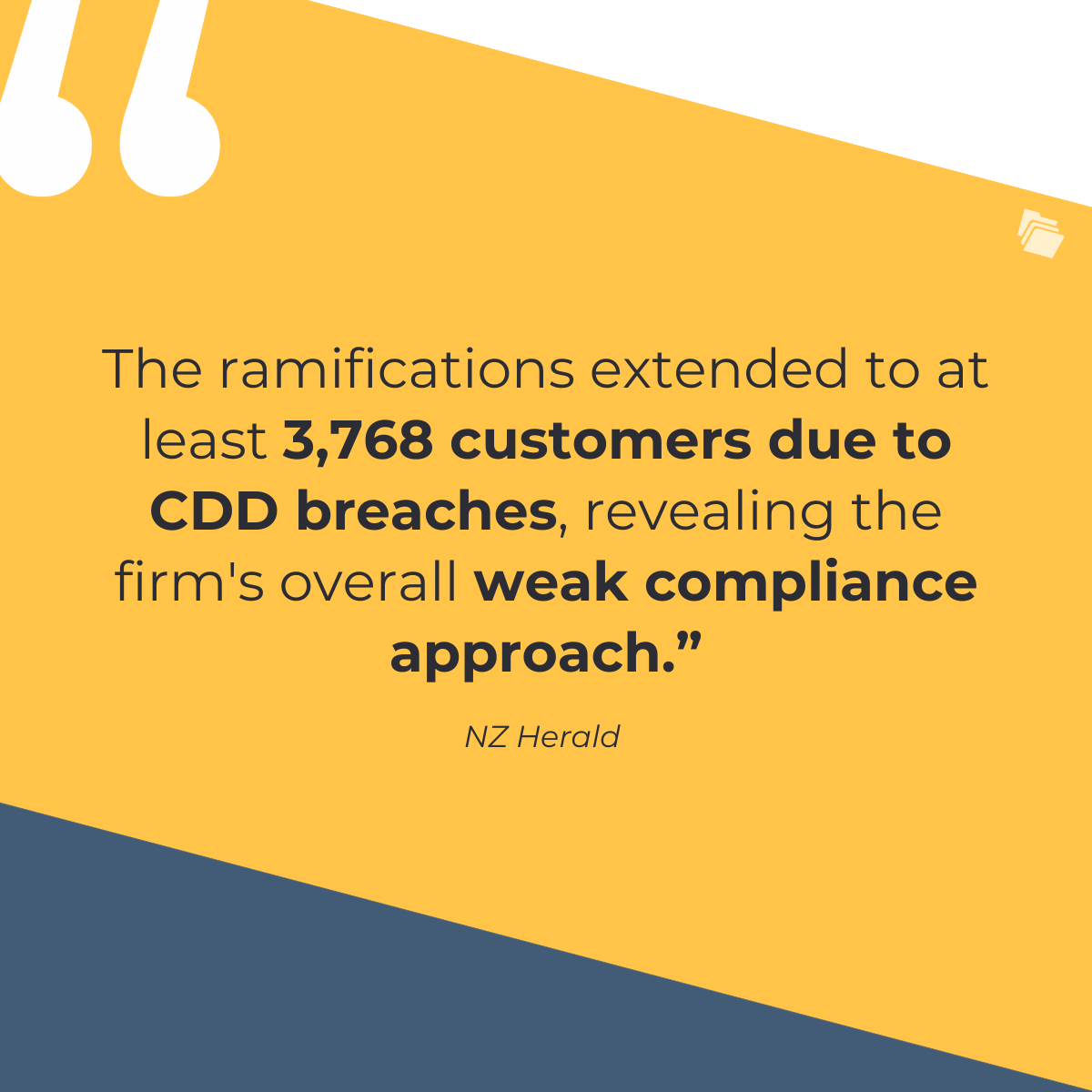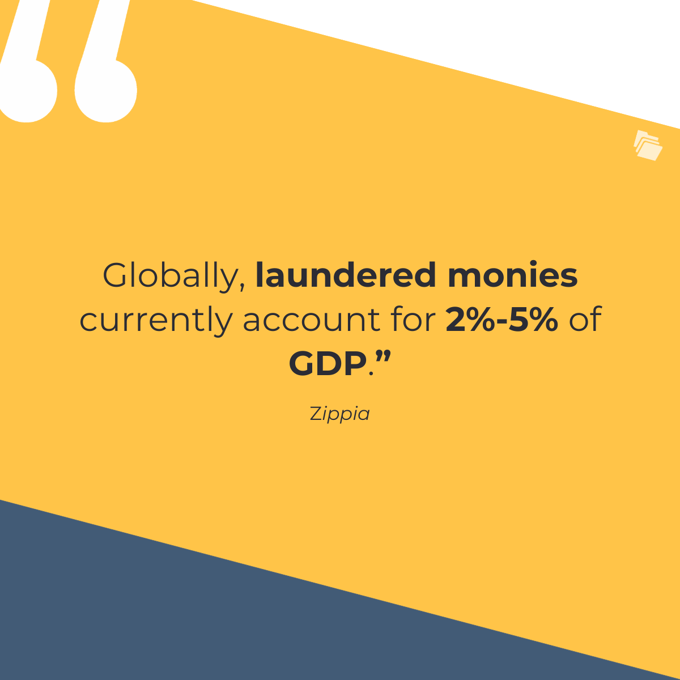The Role of AML and KYC in Preventing Financial Crimes
Learn how AML and KYC bolster financial security and work together as a robust defense against the exploitation of financial systems.
Learn practical tips from Tiger Brokers, including regulations, key takeaways, and technology integration for seamless Customer Due Diligence.
Recent punitive action by New Zealand’s government office for regulation of financial services should serve as an objective lesson for banks on the importance of satisfying customer due diligence (CDD) requirements. Tiger Brokers (NZ) Limited, a fintech company with strong ties to China, has been a significant player in the New Zealand financial landscape since 2015. Notably, their client base largely consists of Chinese New Zealanders, and they took a significant step last year with the launch of their online trading app, Tiger Trade. The app aimed to contest market shares against local New Zealand apps like Sharesies and Hatch Invest.
Recently, this Nasdaq-listed entity with a global user base of 9 million found itself in turbulent waters, receiving steep fines for lapses in completing CDD and anti-money laundering (AML) requirements.
This guide covers the regulatory consequences for Tiger Brokers, explains what CDD is, and outlines lessons to learn from the case and technologies to use to meet the challenges of CDD requirements in financial services.
Tiger Brokers faced severe repercussions for their failures in CDD enforcement. The Financial Markets Authority (FMA) of New Zealand identified that Tiger Brokers had four negligent oversights in their anti-money laundering and countering financing of terrorism (CFT) protocols, especially concerning CDD, which included failure to:
The aftermath of these oversights was substantial. Approximately NZ$60.8 million traveled through New Zealand's financial infrastructure without adequate checks between April 2019 and January 2020. The ramifications extended to at least 3,768 customers due to CDD breaches, revealing the firm's overall weak compliance approach. For these extensive CDD failures, New Zealand’s FMA leveled more than $900,000 in fines against Tiger Brokers.

CDD is a regulatory staple of modern financial systems, acting as a primary defense against many potential financial crimes. Historically rooted in legislation targeting organized crime, CDD dictates how financial institutions verify the identity of prospective and current customers, ensuring they aren't unintentionally abetting unlawful actions. CDD regulations exist in many countries and political organizations, including New Zealand, Australia, the U.S., and the E.U.
Typically, CDD requirements have three core objectives:
Historical context illuminates CDD's importance. With the surge of terrorism and related conflicts in the 1990s, an expansive international illegal trade network emerged, amplified by global banking networks like the Society for Worldwide Interbank Financial Telecommunications (SWIFT). These advancements facilitated criminals in evading traditional methods of detection, using established financial institutions for illicit financial transfers and transactions. Recognizing these threats, governments globally institutionalized AML and know your customer (KYC) regulations. These regulations mandated financial institutions to sieve out suspicious actors and funds, aiming to curb the infiltration of illicit funds into the financial system.
However, systems are only as robust as their weakest component. Criminal entities, often more agile and adaptable than governments, have consistently scouted for regions or sectors with sub-par AML and KYC enforcements. Globally, laundered monies currently account for 2%-5% of GDP. Financial criminals also perpetually innovate, employing new channels like cryptocurrencies and even unconventional avenues such as art and education to launder funds.

In response to the evolving challenges, global regulators are continuously fortifying AML and KYC regulations, while broadening their ambit to encompass diverse sectors. More organizations now fall under the purview of CDD, with KYC checks becoming an ongoing obligation rather than a one-time process.
There are five kinds of CDD — each having a portion of requirements also called KYC:
The typical level of CDD applied to most customers when establishing a new business relationship or conducting occasional transactions. It generally involves verifying the customer's identity, understanding the nature of the customer's activities, and assessing any potential risks associated with the customer.
The most basic level of CDD involves fewer checks than standard or other forms of CDD. It is used for low-risk customers where the potential for money laundering or terrorist financing is considered minimal. In such cases, institutions might not go through the full spectrum of due diligence checks.
Used for higher-risk customers or in situations where there's a higher risk of money laundering or terrorist financing. Enhanced CDD involves more rigorous checks and ongoing monitoring than standard CDD. It may include gathering additional information about the customer, understanding the source of their funds, and closely monitoring their transactions.
Not a separate type in the traditional sense. Ongoing CDD refers to the continuous monitoring of customer relationships. It ensures that customer profiles remain accurate, reviews transactions to ensure they align with what is expected from the customer's profile, and checks for changes in risk levels.
For individuals and organizations with initial low-risk KYC assessments. Delayed due diligence allows financial services to begin before some CDD requirements are completely met, with the stipulation that any failure on the part of the customer will result in an immediate cutoff of services and reporting to applicable authorities.
KYC requirements are part of the longer CDD process and primarily concentrate on the customer identification process. This includes verifying the identities of individual clients, potential corporate entities, and their key stakeholders, and understanding their business relationships. KYC is the initial phase of CDD where financial institutions collect personal and business information.
Lastly, AML requirements target money laundering specifically. AML focuses on monitoring and scrutinizing transactions that appear out of place or suspicious — such as unusually large transfers, cross-border dealings, or vast cash transactions. Financial institutions must report such red-flagged activities to ensure potential financial misdemeanors are addressed proactively.
From an AML perspective, CDD ensures financial institutions do not unknowingly enable illegal activities. In tandem with increasing digitalization in the industry, the risk of data breaches in financial services and other sectors is on the rise. Consequently, effective CDD practices require rigorous data protection protocols.
Protecting customer personally identifiable financial information (PIFI) is not only a necessary part of compliance with regulatory mandates. It’s also essential to maintaining customer trust. As such, a robust CDD framework is equally important to guaranteeing sensitive customer data remains uncompromised as it is to prevent financial crimes.
The Tiger Brokers case underscores the critical importance of businesses staying compliant with evolving regulations, guidelines, and developments in CDD within their respective sectors. In a rapidly changing financial landscape, the size of an organization in the market — or its reputation — doesn't absolve firms from their regulatory responsibilities.
The FMA's actions against Tiger Brokers are not just a punitive measure. They provide a stark reminder of the potential repercussions of simple non-compliance — as the FMA case did not need to prove any instances of specific financial crimes, only failure to meet regulatory requirements. To prevent such pitfalls, organizations must view such cases as learning opportunities. Financial service providers can ensure they remain compliant while delivering high-quality customer experiences by benchmarking against industry best practices and adopting new technologies.
One common critique of CDD, KYC, and AML processes is their perceived inefficiency, often leading to prolonged waiting times and customer dissatisfaction. However, technology can play a transformative role in streamlining these procedures. Businesses can automate many of the traditionally manual steps in the due diligence process, from customer identity verification to transaction monitoring, by leveraging digital solutions such as cloud-based document collection platforms.
Advanced analytics can quickly flag suspicious activities, while machine learning (ML) algorithms can adapt and refine their detection methods over time. Additionally, the integration of blockchain technology can provide an immutable, transparent record of customer data and transactions, ensuring both accuracy and integrity. Not only do these tech-driven approaches increase process efficiency, but they also enhance accuracy, reducing both false positives and false negatives. By investing in technological advancements, firms can ensure robust compliance without sacrificing customer experience.
Do you want to streamline document collection and file sharing for CDD? It's crucial to have top-notch security. That's where FileInvite comes in. They offer bank-level security paired with customizable KYC templates. Essentially, it's a tool to help institutions automate their workflows without any hiccups.
Still concerned about security? FileInvite has it locked down. They adhere to SOC 2 Type 2 standards and use robust 256-bit encryption in their client portals. Your data, whether stored or transferred, is in safe hands.
For audit purposes, FileInvite keeps everything transparent with a detailed audit history. No more sifting through endless emails. Their flexible client portal access settings cater to every institution's needs. With FileInvite, solid security meets efficient workflow.
To learn more and request a demo, visit FileInvite today.
Learn how AML and KYC bolster financial security and work together as a robust defense against the exploitation of financial systems.
Learn how to deliver a seamless and efficient onboarding experience for your clients, while also safeguarding all personally identifiable information...
Learn how you can comply with the Know Your Customer (KYC) requirements for a seamless and compliant lending process.
Eliminate the monotony of back-and-forth emails and inefficient systems when gathering client information. Get hours back each week as FileInvite handles the most time-consuming work for you.